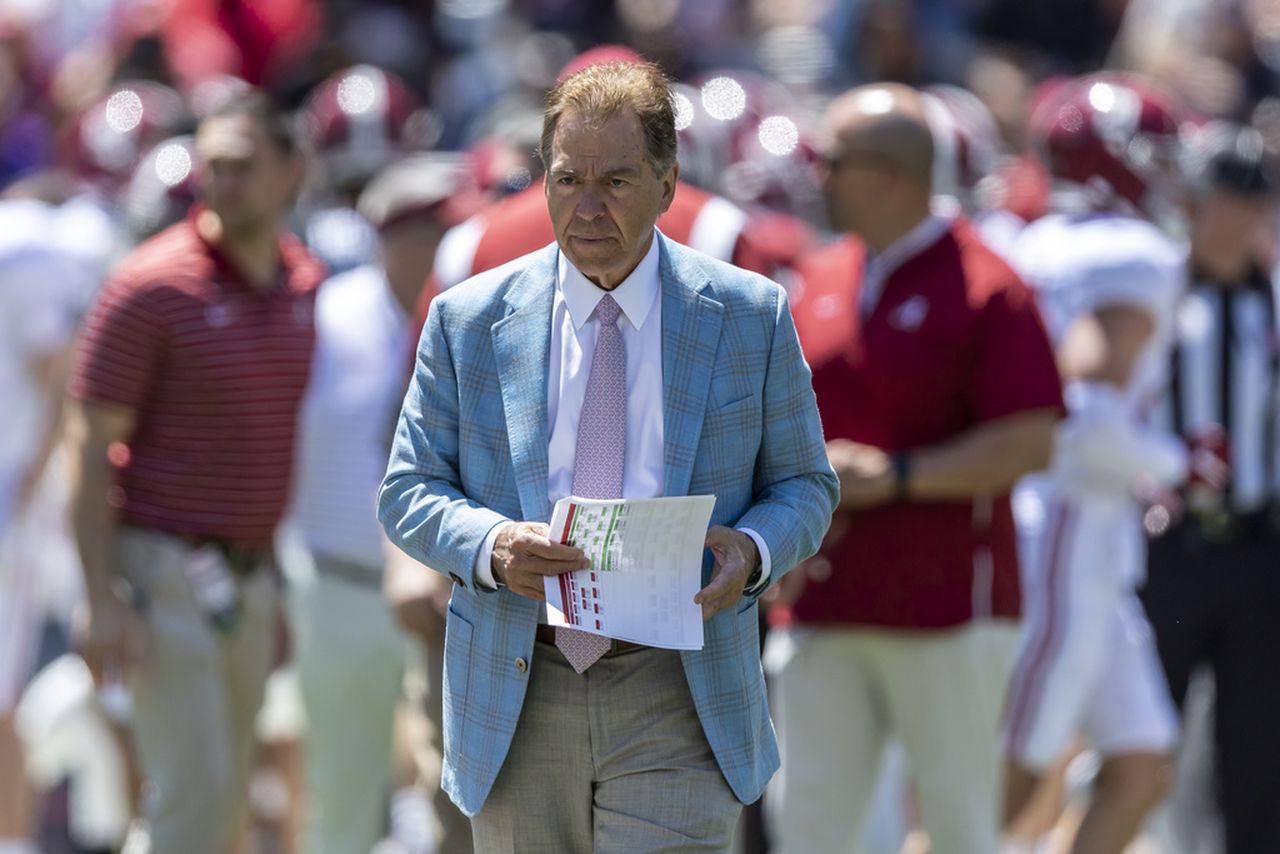Goodman: Nick Saban wants Congress to stop the cheating in college football
Representatives of the Southeastern Conference, including Alabama coach Nick Saban, are in Washington on Wednesday and Thursday to lobby and schmooze members of Congress and their staffers.
Summer field trip!
With Saban, it’s always about recruiting, and so there is no doubt he’ll be able to pull a few lawmakers to his cause. In a twist no one could have ever predicted, Alabama’s legendary coach says he wants Congress to make college football a little fairer for everyone.
From here, this all looks like one big Hail Mary heave — 2nd and 26 inside the Beltway. Saban and the SEC hope Congress can step in and help the NCAA clean up the mess created by allowing athletes to earn money through their name, image and likeness. A reception was planned for Wednesday with lawmakers, and then more meetings are on the docket for Thursday. No one really likes the idea of the U.S. government interfering with collegiate athletics, but these are desperate times for guys like Saban and SEC commissioner Greg Sankey.
RELATED: Nick Saban talks NIL ahead of meeting with Congress
GOODMAN: Nick Saban wants unions but the SEC breaks them up
10 SEC STARS WHO WILL NEVER MAKE THE HALL OF FAME
To put it simply, the problem facing the SEC is that what it used to consider cheating in college football and basketball is now practically legal due to unenforceable rules. Players are being paid to transfer. Players are being paid not to transfer. Recruits are signing with the highest bidder. NIL collectives are running college football behind the scenes. It’s frustrating stuff for people who made their money by having complete and total control over an industry.
The SEC wants help, and it needs Congress to step in and create rules nationally for this new era of pay for play. The NCAA was made toothless by — and this is wry humor of an uncommon variety — state’s rights in places like California. Kids are out there getting rich, but now universities in the SEC and elsewhere want that economy regulated.
It’s going to be a tough sell and not just because Saban makes $12 million a year and schools pay nothing to players. How is Sankey going to keep a straight face when he asks Congress to form some kind of a regulatory agency for paying players when his money-hungry conference recently plundered the Big 12 for Texas and Oklahoma?
And what happens when a conservative politician says they’ll help, but the NCAA’s support of trans rights has to go?
The SEC can’t even come to a consensus on playing nine conference games. The reason is not because the SEC is scared of nine games or the SEC is worried about bowl games or the SEC fears too much competition. The reason is money. The SEC wants more money from the television networks for an extra conference game for each school, and the league is willing to take a few PR hits to get that money.
College football is a business, and it’s hard to square the SEC squeezing every penny for itself with one hand, and then glad-handing politicians with the other in the hopes that Congress will somehow prevent the athletes from earning everything they can.
Does something need to change? Yes, but universities might not like the ultimate answer. What if — GASP! — all this politicking accidentally backfires and leads to players being classified as employees? Saban himself recently said he wouldn’t be against players unionizing if it led to more parity for college football.
Maybe the SEC inviting Saban to speak with Congress was a bad idea after all.
There’s also something else to consider. All this horse trading by the SEC might not matter at all in the long run.
We already know what the Supreme Court thinks of collegiate athletics, and the justices will not be so easily charmed. As a refresher, here was the concurring opinion of Justice Brett M. Kavanaugh that went along with the Supreme Court’s unanimous decision that the NCAA couldn’t bar modest payments to college athletes:
“Nowhere else in America can businesses get away with agreeing not to pay their workers a fair market rate on the theory that their product is defined by not paying their workers a fair market rate. And under ordinary principles of antitrust law, it is not evident why college sports should be any different. The NCAA is not above the law.”
Those still sound like fighting words to me.
Let’s be clear. Saban and members of the SEC aren’t against athletes making money. Saban is just tired of losing players and recruits to other schools based on what he believes to be legalized cheating.
Maybe Saban and the SEC haven’t heard, but in Washington that’s the entire game.
Joseph Goodman is the lead sports columnist for the Alabama Media Group, and author of “We Want Bama”, a book about togetherness, hope and rum. You can find him on Twitter @JoeGoodmanJr.
